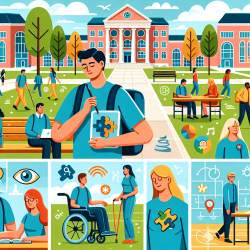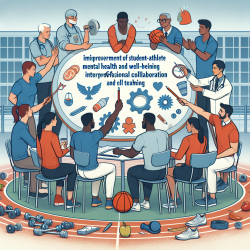Enhancing Support for Neurodiverse College Students: Practical Insights for Practitioners

As practitioners in speech language pathology, we constantly strive to improve outcomes for children and young adults. The recent research titled “For a Long Time Our Voices have been Hushed”: Using Student Perspectives to Develop Supports for Neurodiverse College Students offers valuable insights that can help us enhance our practice and support neurodiverse students more effectively.The study underscores the importance of involving neurodiverse students in the development and evaluation of support programs. By understanding their self-reported needs, we can create interventions that are both effective and socially valid. Here are some key takeaways and practical steps to implement these findings:
1. Focus on Social Skills and Self-Advocacy
The research highlighted two primary areas of support: social skills and self-advocacy. Social skills interventions were associated with decreased anxiety and autism symptoms, while self-advocacy training led to increased perceived social support and academic self-efficacy. To integrate these findings into your practice:
- Develop mentor-led group programs that focus on social skills and self-advocacy.
- Use role-plays, discussions, and practical exercises to teach these skills.
- Encourage students to share their experiences and provide feedback to continuously improve the program.
2. Adopt Universal Design Principles
The study suggests that supports designed according to Universal Design principles can benefit a broad range of neurodiverse students. This approach involves creating flexible learning environments that accommodate various learning styles and needs. To implement Universal Design:
- Provide multiple means of representation, such as visual aids, written instructions, and interactive activities.
- Offer multiple means of action and expression, allowing students to demonstrate their knowledge in different ways.
- Create an inclusive classroom culture where all students feel valued and supported.
3. Foster Peer Mentorship
Peer mentorship emerged as a critical component of successful support programs. Mentors can provide individualized guidance and model effective social and self-advocacy skills. To establish a peer mentorship program:
- Recruit and train mentors who understand the unique needs of neurodiverse students.
- Pair mentors with mentees based on shared interests and goals.
- Regularly monitor and evaluate the mentorship relationships to ensure they are beneficial for both parties.
4. Encourage Self-Reflection and Feedback
The research emphasized the importance of self-reflection and feedback in developing effective support programs. Encourage students to reflect on their progress and provide feedback on the program’s effectiveness. This can be achieved through:
- Regular focus groups and individual feedback sessions.
- Open-ended surveys and self-assessment tools.
- Creating opportunities for students to take on leadership roles within the program.
By incorporating these evidence-based strategies into your practice, you can create a more supportive and effective environment for neurodiverse college students. For more detailed insights and to read the original research paper, please follow this link:
“For a Long Time Our Voices have been Hushed”: Using Student Perspectives to Develop Supports for Neurodiverse College Students.
Citation: Gillespie-Lynch, K., Bublitz, D., Donachie, A., Wong, V., Brooks, P. J., & D’Onofrio, J. (2017). “For a Long Time Our Voices have been Hushed”: Using Student Perspectives to Develop Supports for Neurodiverse College Students. Frontiers in Psychology, 8, 544. https://doi.org/10.3389/fpsyg.2017.00544










